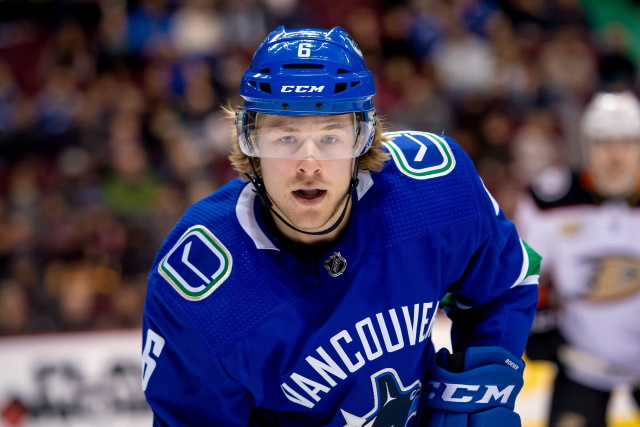The dominos (post-Mitch Marner deal) falling everywhere as Brock Boeser signed a three-year extension late Monday night with the Vancouver Canucks.
Since the late report Monday night, many sources reported the details of the new pact. Therefore, it’s time to take a look at it ourselves.
What Brock Boeser means to the Vancouver Canucks
Boeser’s ice time bumped up to just over 19 minutes a night in his second full season. Injuries did impact his year a bit but he still played 69 games which were seven more than his rookie campaign.
The winger improved at even-strength totaling 41 of his 56 points. Boeser dropped off on the power-play a bit as his goals (6) and assists (9) were a 30% fall from his production in his rookie season.
Now, the contract is signed and sealed. The first question asked has to be, when does Boeser break the 30-goal plateau? His shooting percentage dropped to 12.4% last year and he did hit the net 30 more times. If his shot projections trend upward in any way (say 230 shots), then 30+ goals are attainable.
The soon to be 23-year-old gains a chance to have 60+ point upside in Vancouver this year but that will depend on his health. If he can play 75+ games, that would be a major asset for the Canucks.
Here is a PuckPedia snapshot on Brock Boeser.
Updated with Contract Breakdown per @sportsnetmurph:https://t.co/Mw4IHtyasc pic.twitter.com/xyhmuy7sLK
— PuckPedia (@PuckPedia) September 17, 2019
Next, there is the numerology.
The numerology of Brock Boeser
Health exists as the only real concern with Boeser. His offense has been good enough for the most part. One hopes his abilities as a sniper come more and more to the forefront during this extension.
The forward rose dramatically to a +5% relative last year and that second half was about the same even with Vancouver’s up and down nature. Again, chances and offense were there but the execution was still a touch off.
Also, most point out that Boeser’s upside keeps on going up. Boeser’s points per 60 ended at 1.93 (was nearly 2 for a good part of the season). Furthermore, his on-ice shooting percentage is double-digits in the early going of his career. That figures not to change much this year.
Even his expected goals for was 3.4% above the team relative which is a very solid number. There are a couple of minor concerns again as seen below.
Here is a standardized RAPM chart from Evolving Hockey.

Boeser’s power-play part of the chart concerns few as Vancouver had some bad luck in the goals department last season. Also, the expected goals stayed elevated which was encouraging.
When we peaked back at the 2017-18 chart, a few things were noticeable. Offensive goals for still trends upward and well into the positive. Defensive Corsi For still trends negative. That is a bit of a concern but Boeser is paid to score goals and create offense. Defensive expectations should be tempered here.
Can Boeser take that third-year leap this year? Most indications think that answer will be yes. The forward expects to be deployed in the offensive zone at least 65-70 percent of the time (nearly 70% in 2018-19).
This signing helps both sides. Few dispute the AAV but that third year is an incentive for Boeser. It will set up quite the qualifying offer as the forward will still be an RFA at the end of this deal.
Boeser likely evolves into that bonafide sniper with playmaker upside during this extension.
The details of the Brock Boeser deal
The $5.875 million AAV for three seasons continues the trend of three-year bridge deals with the kicker in the final year.
Breakdown of Boeser contract.
4.0 (700 salary / 3.3M SB)
6.125 (3.125 salary / 3M SB)
7.5 salary
— Dan Murphy (@sportsnetmurph) September 17, 2019
This is a bit similar to the structure of the Charlie McAvoy contract. Boeser does receive $6.3 million worth of signing bonuses (McAvoy only 3.5 million). Vancouver pays quite a huge price for this bridge extension because the next contract will be far less friendly.
The Canucks can dodge a $7.5m qualifying offer by electing salary arb in year 4 – in which they can push for a 15% pay cut to $6.375m. Not committed to a $7.5m minimum. https://t.co/quzj0z1IKv
— Rory Johnston (@rnfjohnston) September 17, 2019
Some final words on Brock Boeser
Boeser showed last year he can take on the big minutes. He logged over 19 minutes in ice time and did not drop off terribly as some feared. His points per game dropped a bit (0.89 down to 0.81) but not in an alarming way. Health remained again a bit of concern along with some defensive shortcomings.
Boeser expects to live up to his new salary but how much will his role expand in that time? With Elias Pettersson developing at an excellent rate, is this the pairing many references to as the future of the Vancouver Canucks? That answer appears to be yes as Vancouver is in good hands offensively for years to come.



